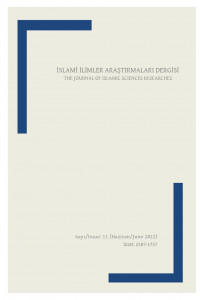Abstract
Kur'an'ın anlaşılması ve ilâhi mesajın mana yönüyle insanlığa doğru bir şekilde aktarılması gayesine hizmet eden isimlerden biri son dönem İslam alimlerinden Said Nursî'dir (1878-1960). O, Birinci Dünya Savaşında cephede telif ettiği klasik tefsir tarzında telif ettiği İşâratu'l-İ'câz isimli eserini, tasavvur ettiği altmış-yetmiş ciltlik bir tefsirin ilk cildi olarak kaleme almış, ancak bir süre sonra genelde insanlığı, özelde İslam alemini derinden sarsan manevi buh-ranlara şahit olduğu için bu fikrinden vazgeçmiş ve mesaisini tamamen Risâle-i Nur'un telifi-ne tahsis etmiştir. Said Nursî, Risâle-i Nur'u manevi tefsir olarak nitelendirmiş ve Risâle-i Nur'da yapmış olduğu tefsirlerde Kur'ânî metodu takip ettiğini savunmuştur. Manevî tefsir tabiri Said Nursî'ye ait bir ıstılah olup onun tefsir anlayışını anlatan şemsiye bir kavramdır. Bu anlayışın önemli sacayaklarından biri şuhûdî metod olup, kâinatın Kur'ânî hakikatlere olan şehâdetinin öne çıkarılmasıdır. Bir diğeri ise makalemizin konusunu oluşturan hakikat eksenli tefsir yaklaşımıdır. Hakikat eksenli tefsir anlayışı; ayetlerin, içerdiği hakikatlerin mer-keze alınarak tefsir edilmesine dayanır. Said Nursî, Risâle-i Nur'da Kur'ân'ın inanç esaslarına dair ayetlerini genellikle bu anlayışla beyan ve tefsir etmiştir. Kur'ânî hakikatlerin izah ve ispatında ise çoğunlukla tabîi olguların bir başka deyişle kevnî ayetlerin şâhitliği üzerinden gerçekleştirmeye çalışmıştır. O, üslup olarak temsil metodunu etkin bir şekilde kullanmış, böylece izah ettiği konuyu her kesimden insanın anlayabileceği bir hitapla sunmak istemiştir. Cenâb-ı Hakk'ın Kur'ân'da ifade ettiği hakikatlerden biri, kudretinin sonsuzluğu, yani ilâhî kudret karşısında her şeyin eşit olduğu gerçeğidir. Bu gerçek, klasik tefsirlerde ve Risâle-i Nur'da izah ve ispat edilmek istenmiştir. Bu makalede ilâhî kudreti ifade eden ayetler bağla-mında Said Nursî'nin hakikat eksenli tefsir anlayışı, tahkik ve mukayeseye dayalı metotlar üzerinden incelenmiştir. Sonuç olarak, klasik tefsirlerin ilâhî kudret karşısında her şeyin eşit oluşunun keyfiyetine dair icmâlî açıklamalarda bulunduğu, buna karşılık Nursî'nin söz konu-su hakikati ayrıntılı bir şekilde izah ve ispat etmeye çalıştığı görülmüştür.
References
- Nesefi, Eb'ul-Berekât Hâfizuddîn. Medâriku't-Tenzîl ve Hakâiku't-Te'vîl. thk. Yusuf Ali Bedyuvi. 3 Cilt. Beyrut: Dâru'l-Kelimu't-Tayyib, 1998.
- Nursî, Bediüzzaman Said. Âsâr-ı Bediiyye. İstanbul: Envar Neşriyat, 5. Basım, 2017.
- Nursî, Bediüzzaman Said. Barla Lahikası. 3. Basım, İstanbul: Envar Neşriyat, 2005.
- Nursî, Bediüzzaman Said. Emirdağ Lahikası. 3.Basım, İstanbul: Envar Neşriyat, 2005.
- Nursî, Bediüzzaman Said. Muhâkemat. İstanbul: Sözler Neşriyat, 2004.
- Nursî, Bediüzzaman Said. Risâle-i Nur Külliyatından Mesnevî-i Nûriye. çev. Abdulmecid Nursî. İstanbul: Diyanet İşleri Başkanlığı Yayınları, 2016.
Said Nursî's Understanding of Truth-Oriented Tafsir in The Con-text of Verses Expressing The Divine Power
Abstract
One of the names that served the purpose of understanding the Qur'an and accurately transmitting the divine message to Humanity is Said Nursî(1878-1960), one of the last İslam scholars. He wrote his work Ishârât al Îjâz, a classical-style Tafsir that he copyrighted at the front line in the First World War, as the first volume of a sixty-seventy-volume Tafsir that he envisioned, but after a while he abandoned this idea as a witness to the spiritual crises that deeply shook humanity, especially the Islamic world, and devoted his shift entirely to the royalty of Risâla-i Nûr. Said Nursi described the Risale-i Nur as a spiritual commentary and argued that he followed the Qur'anic method in the commentaries he made in the Risa-le-i Nur. The term "spiritual tafsir" is a term belonging to Said Nursi and is an umbrella concept describing his understanding of tafsir. One of the important pillars of this unders-tanding is the shuhudi method, emphasizing the witnessing of the universe to the Qur'anic truths. Another is the truth-based interpretation approach, which is the subject of our article. Truth-based interpretation; It is based on the interpretation of the verses by cente-red on the truths they contain. Said Nursi generally explained and interpreted the verses of the Qur'an on the principles of belief in the Risale-i Nur with this understanding. In the explanation and proof of the Qur'anic truths, he mostly tried to do it through the witnes-sing of natural facts, in other words, of the literal verses. He used the method of represen-tation effectively as a style, so he wanted to present the subject he explained with an add-ress that could be understood by people from all walks of life. One of the truths that Al-mighty Allah expresses in the Qur'an is the infinity of His power, that is, the fact that everything is equal before the divine power. This fact has been tried to be explained and proved in classical tafsir and Risale-i Nur. In this article, Said Nursi's understanding of truth-oriented interpretation in the context of verses expressing divine power has been examined through methods based on investigation and comparison. As a result, it has been seen that classical commentaries made concise explanations about the equality of all things in the face of divine power, while Nursi tried to explain and prove the said truth in detail.
References
- Nesefi, Eb'ul-Berekât Hâfizuddîn. Medâriku't-Tenzîl ve Hakâiku't-Te'vîl. thk. Yusuf Ali Bedyuvi. 3 Cilt. Beyrut: Dâru'l-Kelimu't-Tayyib, 1998.
- Nursî, Bediüzzaman Said. Âsâr-ı Bediiyye. İstanbul: Envar Neşriyat, 5. Basım, 2017.
- Nursî, Bediüzzaman Said. Barla Lahikası. 3. Basım, İstanbul: Envar Neşriyat, 2005.
- Nursî, Bediüzzaman Said. Emirdağ Lahikası. 3.Basım, İstanbul: Envar Neşriyat, 2005.
- Nursî, Bediüzzaman Said. Muhâkemat. İstanbul: Sözler Neşriyat, 2004.
- Nursî, Bediüzzaman Said. Risâle-i Nur Külliyatından Mesnevî-i Nûriye. çev. Abdulmecid Nursî. İstanbul: Diyanet İşleri Başkanlığı Yayınları, 2016.
Details
| Primary Language | Turkish |
|---|---|
| Subjects | Religion, Society and Culture Studies |
| Journal Section | Research Articles |
| Authors | |
| Publication Date | June 15, 2022 |
| Submission Date | February 17, 2022 |
| Published in Issue | Year 2022 Issue: 11 |


